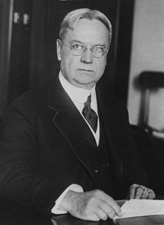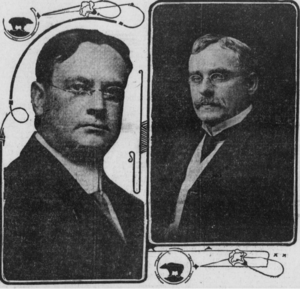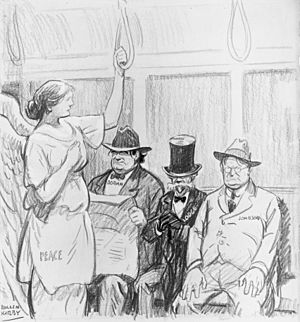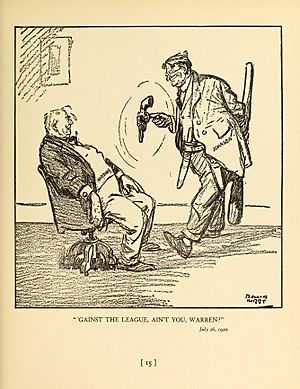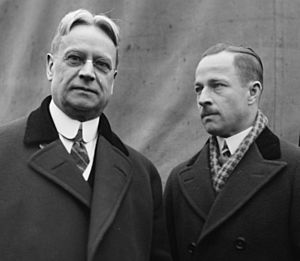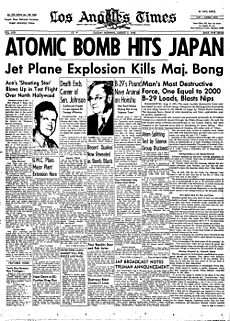Hiram Johnson facts for kids
Hiram Warren Johnson (born September 2, 1866 – died August 6, 1945) was an American lawyer and politician. He served as the 23rd governor of California from 1911 to 1917. Johnson became well-known across the country in the early 1900s.
Quick facts for kids
Hiram Johnson
|
|
|---|---|
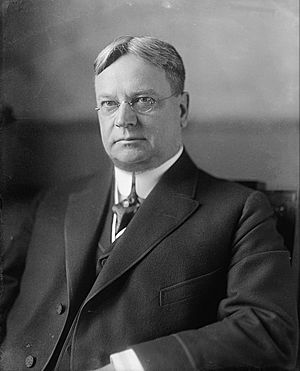
Johnson, c. 1926
|
|
| United States Senator from California |
|
| In office March 16, 1917 – August 6, 1945 |
|
| Preceded by | John D. Works |
| Succeeded by | William Knowland |
| 23rd Governor of California | |
| In office January 3, 1911 – March 15, 1917 |
|
| Lieutenant | A. J. Wallace John Morton Eshleman William Stephens |
| Preceded by | James Gillett |
| Succeeded by | William Stephens |
| Personal details | |
| Born | September 2, 1866 Sacramento, California, U.S. |
| Died | August 6, 1945 (aged 78) Bethesda, Maryland, U.S. |
| Resting place | Cypress Lawn Memorial Park |
| Political party | Republican |
| Other political affiliations |
Progressive (1912–1916) |
| Spouse | Minne McNeal (m. 1886) |
| Children | Hiram W. Johnson, Jr. and Archibald McNeal Johnson |
| Education | Heald's Business College University of California, Berkeley |
In 1916, he was elected as a U.S. Senator for California. He was re-elected five times and served until he passed away in 1945.
As governor, Johnson was a key leader in the American progressive movement. This movement aimed to improve society and government. He ran for vice president with Theodore Roosevelt in the 1912 presidential election. They were part of the Progressive Party.
As a U.S. Senator, Johnson became a strong supporter of isolationism. This means he believed the U.S. should stay out of international conflicts. He was among those who opposed the Treaty of Versailles and rejected the idea of the League of Nations. Later, Johnson also spoke out against the United Nations Charter.
Johnson started his career as a stenographer and reporter. He then became a lawyer in his hometown of Sacramento, California. After moving to San Francisco, he worked as an assistant district attorney. He became known for fighting public corruption. Johnson won the 1910 California governor election with support from the Lincoln–Roosevelt League. He brought in several progressive changes. These included setting up a railroad commission and allowing citizens to directly influence laws and recall state officials.
Johnson joined Roosevelt to form the Progressive Party. He became their vice-presidential candidate in 1912. Their ticket finished second nationally, which was one of the best results for a third party in U.S. history.
Johnson was elected to the U.S. Senate in 1916. He became a leader among Progressive Republicans in the Senate. He was known for his early support of isolationism. He opposed the U.S. joining World War I and participating in the League of Nations.
He tried to become the Republican presidential nominee in 1920 and 1924 but was not successful. He supported Democratic candidate Franklin D. Roosevelt in the 1932 election. Johnson first supported Roosevelt's New Deal programs. However, by late 1936, he strongly opposed Roosevelt. Johnson's health declined in his later years. Still, he remained in the Senate until his death in 1945.
Contents
Early Life and Career
Hiram Johnson was born in Sacramento, California on September 2, 1866. His father, Grove Lawrence Johnson, was a lawyer and a Republican U.S. Representative. His mother, Annie De Montfredy, was a descendant of important historical figures. Johnson had one brother and three sisters.
Johnson went to public schools in Sacramento. He graduated from Sacramento High School in 1882 at age 16. He then worked as a stenographer in his father's law office. He also attended Heald's Business College. He studied law at the University of California, Berkeley from 1884 to 1886. After becoming a lawyer in 1888, Johnson practiced law in Sacramento with his brother.
Johnson was also active in politics as a Republican. In 1900, he became the city attorney for Sacramento.
In 1902, Johnson moved to San Francisco. There, he became known as a skilled lawyer, mainly defending people in criminal cases. He also became involved in political reform. In 1908, he helped District Attorney Francis J. Heney in a famous case against Abe Ruef and Mayor Eugene Schmitz for corruption. When Heney was injured, Johnson took over the case and won.
Governor of California (1911–1917)
In 1910, Johnson won the governor election as a member of the Lincoln–Roosevelt League. This was a Progressive Republican group. He ran on a platform that opposed the powerful Southern Pacific Railroad. During his campaign, he traveled across the state in an open car. He visited many small towns that could not be reached by train.
As governor, Johnson helped create rules to make voting and the political process fairer. For example, he made it easier for citizens to recall state officials. This means citizens could vote to remove an official from office before their term ended. This recall measure was used to remove Governor Gray Davis in 2003. There was also an attempt to recall Governor Gavin Newsom in 2021.
Johnson was a populist, meaning he supported the rights and power of ordinary people. He pushed for many democratic reforms. These included electing U.S. Senators by direct popular vote. He also supported cross-filing, initiative, referendum, and recall elections. These changes gave California citizens more direct control over their government than any other U.S. state at the time.
Johnson also helped control the power of the Southern Pacific Railroad. He did this by setting up a state railroad commission.
Johnson supported the California Alien Land Law of 1913. This law prevented Asian immigrants from owning land in California.
1912 Vice Presidential Campaign
In 1912, Johnson helped start the national Progressive Party. He ran as the party's vice presidential candidate. He was on the same ticket as former President Theodore Roosevelt. Roosevelt and Johnson won California by a small margin. However, they finished second nationally behind the Democratic candidates, Woodrow Wilson and Thomas Marshall. Their second-place finish was ahead of the Republican President William Howard Taft. This remains one of the strongest performances for any third party in American history.
Johnson was re-elected governor of California in 1914. He ran as the Progressive Party candidate. He received almost twice as many votes as his Republican opponent.
U.S. Senator (1917–1945)
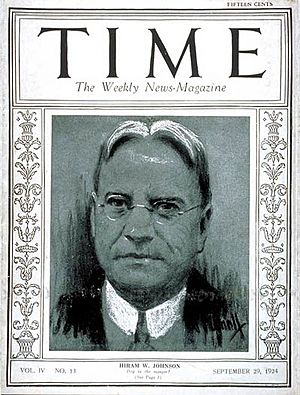
In 1916, Johnson successfully ran for the U.S. Senate. He defeated Democrat George S. Patton Sr.. He took office on March 16, 1917. Johnson was a strong opponent of the U.S. entering World War I. He is said to have stated, "The first casualty when war comes is truth." As an isolationist, Johnson voted against the League of Nations during his first term.
During his time in the Senate, Johnson led several committees. These included committees on Cuban Relations, Patents, Immigration, Territories and Insular Possessions, and Commerce.
In the Senate, Johnson helped pass the Immigration Act of 1924. He worked with others to stop Japanese and other East Asian immigrants from entering the United States.
In the early 1920s, the movie industry wanted to create its own rules to avoid government censorship. Senator Johnson was considered to lead a new group for this purpose. Ultimately, Will H. Hays was chosen to head the new Motion Picture Producers and Distributors of America in 1922.
Johnson was very popular as a Senator. In 1934, he was re-elected with 94.5 percent of the votes. Both the Republican and Democratic parties nominated him. His only opponent was Socialist George Ross Kirkpatrick.
In 1945, Johnson was not present for the vote to approve the United Nations Charter. However, he made it known that he would have voted against it.
Presidential Politics
After Theodore Roosevelt passed away in 1919, Johnson became a leading figure in the progressive movement. In 1920, he ran for the Republican nomination for president. However, he was defeated by Senator Warren Harding. Johnson was asked to be Harding's running mate but declined.
Johnson also sought the 1924 Republican nomination against President Calvin Coolidge. However, his campaign ended after he lost the California primary election. Johnson chose not to challenge Herbert Hoover for the 1928 presidential nomination. Instead, he decided to seek re-election to the Senate.
In the 1932 presidential election, Johnson disagreed with President Hoover. He was one of the most well-known Republicans to support Democrat Franklin D. Roosevelt. During Roosevelt's first term, Johnson supported the president's New Deal economic recovery plans. He often voted with the Democrats. However, by late 1936, he became very critical of Roosevelt. Johnson, despite his poor health, spoke out against Roosevelt and the New Deal. This happened after Roosevelt tried to change the Supreme Court in 1937.
Personal Life
In January 1886, Johnson married Minne L. McNeal (1869-1947). They had two sons: Hiram W. "Jack" Johnson, Jr. (1886-1959) and Archibald "Archie" McNeal Johnson (1890-1933). Both sons became lawyers in California and served in the army. Hiram Jr. was a veteran of World War I. He became a lieutenant colonel in the Army Air Corps during World War II. Archie Johnson was a major in the field artillery corps and was wounded during World War I.
Death
Hiram Johnson served in the Senate for almost 30 years. He passed away at the Naval Hospital in Bethesda, Maryland, on August 6, 1945. This was the same day the U.S. dropped an atomic bomb on Hiroshima. He had been in poor health for several months. He was buried in a mausoleum at Cypress Lawn Memorial Park in Colma, California. His remains are buried with his wife, Minnie, and their two sons.
Legacy
In his first speech as governor on January 3, 1911, Johnson said his main goal was to make the government serve only the people. He wanted to give people the power to protect themselves. Johnson suggested adding the initiative, referendum, and recall to the state Constitution. All three of these progressive changes were made during his time as governor. This secured Johnson's place as a top progressive reformer in California politics.
His role in creating the direct democratic process for removing elected officials was discussed again during the successful 2003 California recall election of Governor Gray Davis. Republican Arnold Schwarzenegger, who won that election, mentioned Johnson's progressive legacy in his speeches. Johnson's importance in promoting California's recall and ballot initiative processes was also highlighted during the unsuccessful 2021 California recall election of Governor Gavin Newsom.
On August 25, 2009, Governor Schwarzenegger and his wife, Maria Shriver, announced that Johnson would be one of 13 people inducted into the California Hall of Fame that year.
Johnson held the record as California's longest-serving U.S. Senator for over 75 years. This record was broken by Democrat Dianne Feinstein on March 28, 2021. He is still the longest-serving Republican senator from California.
The Hiram Johnson papers, which include many letters he wrote to his sons, are kept at the Bancroft Library at the University of California, Berkeley.
Hiram Johnson High School in Sacramento, California is named in his honor.
See also
 In Spanish: Hiram Johnson para niños
In Spanish: Hiram Johnson para niños
- List of United States Congress members who died in office (1900–49)
Images for kids
 | Jessica Watkins |
 | Robert Henry Lawrence Jr. |
 | Mae Jemison |
 | Sian Proctor |
 | Guion Bluford |


